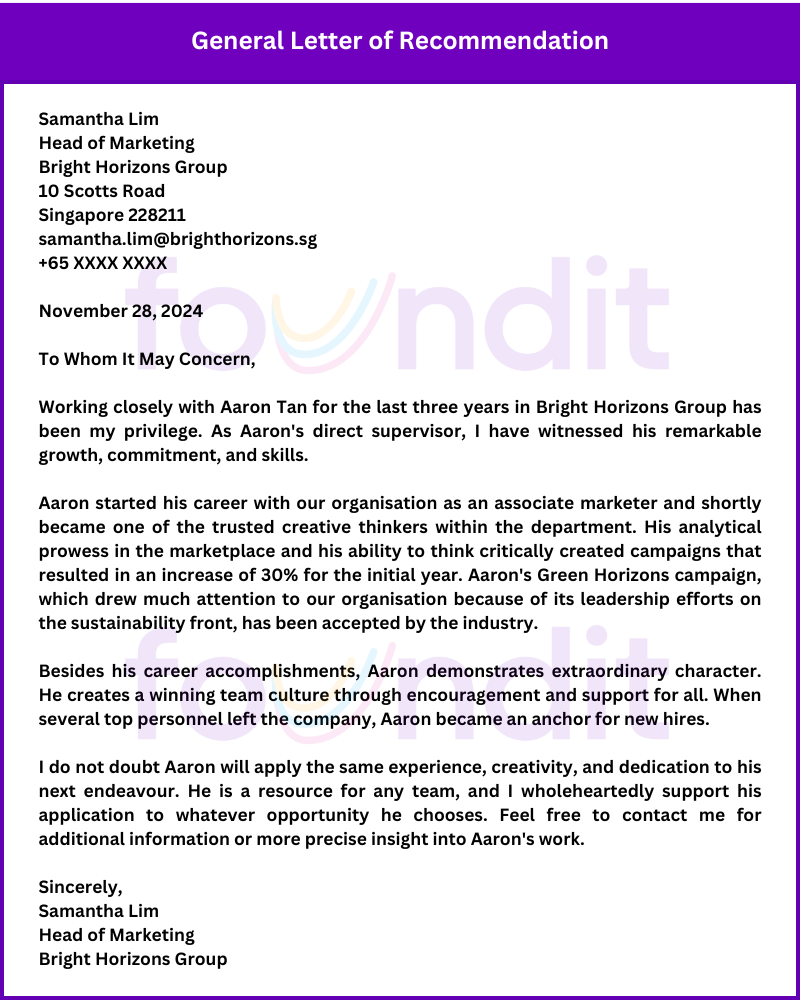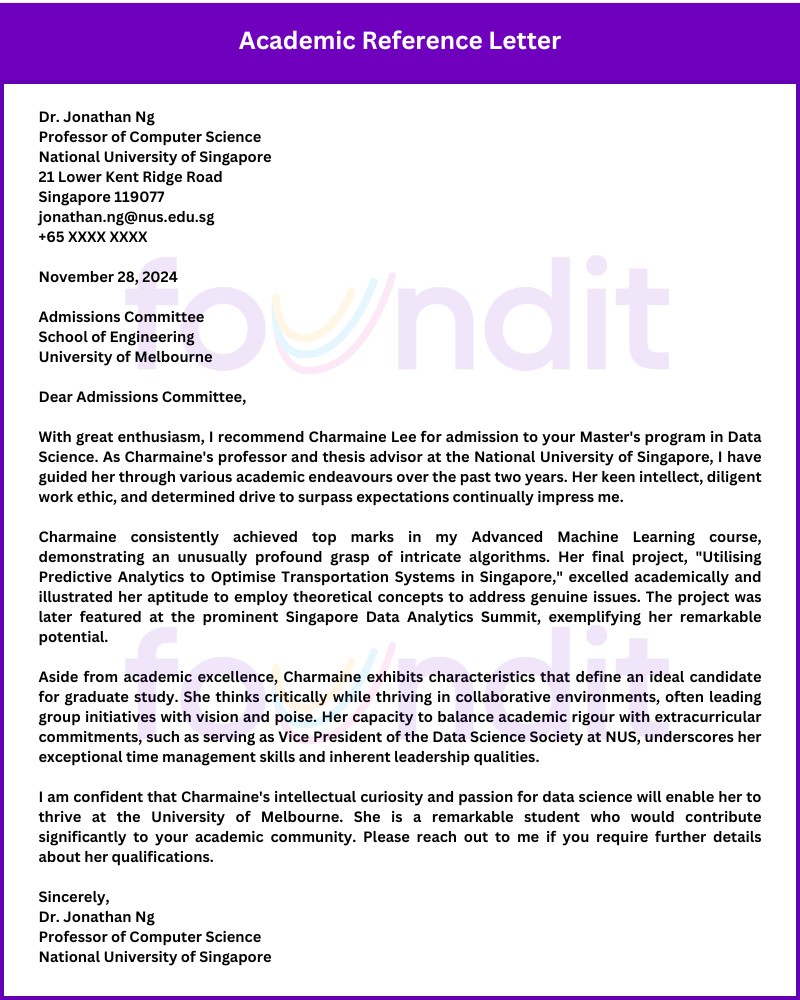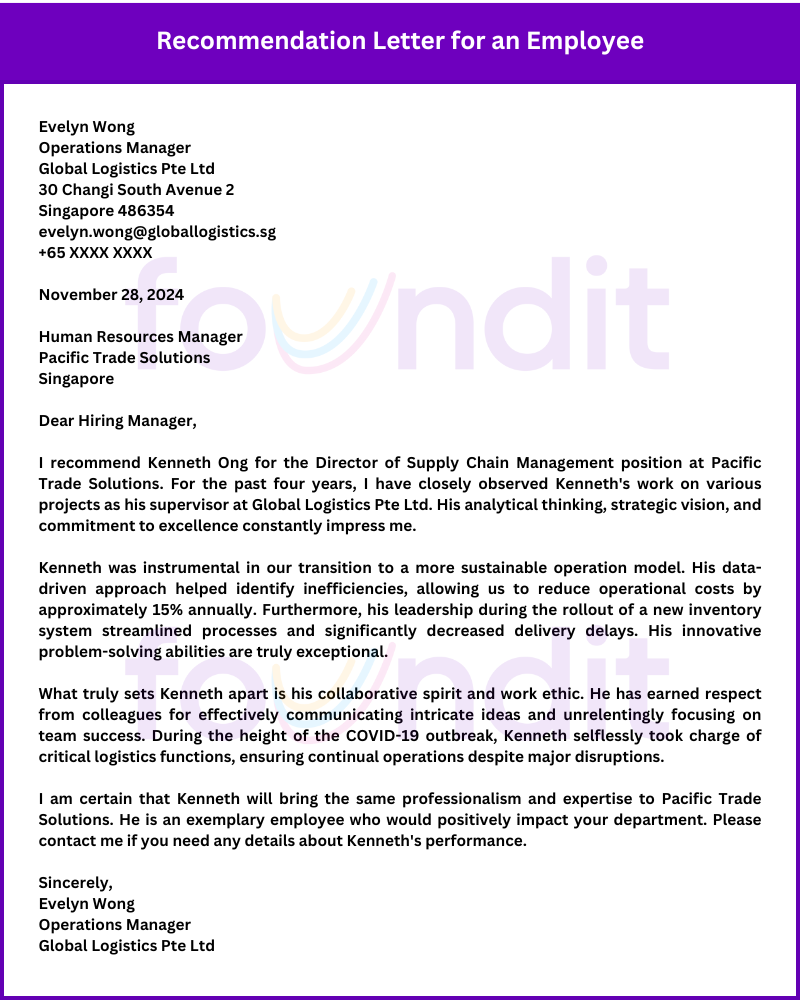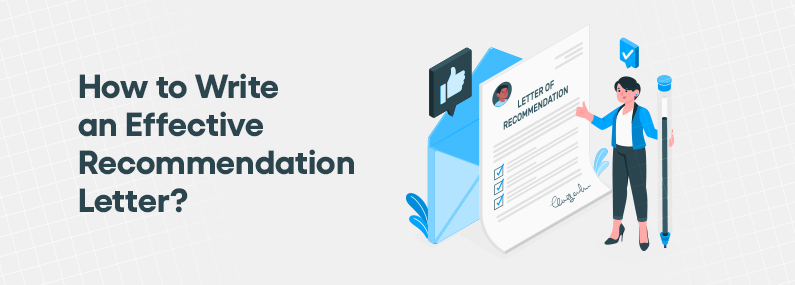A recommendation letter is an important way to support someone’s application by sharing your experience with their unique skills, compassionate character, and notable achievements. A thoughtfully written recommendation can significantly influence how decision-makers perceive the candidate, whether for a prestigious university program or a promising new career opportunity. It helps reveal the person’s unrealised potential through detailed examples and meaningful personal insights from your history.
However, composing an impactful letter of recommendation demands more than simply stating positive sentiments. It should be thoroughly detailed, tailored to the specific purpose, and authentically echo your acquaintance with the individual.
In this guide, we will walk you through the process step-by-step to assist you in crafting a recommendation letter that stands out and leaves an enduringly strong impression.
1. Before You Begin
Building a solid foundation is imperative before crafting a recommendation letter. Understanding the letter’s aim and providing related details ensures your recommendation is targeted, thoughtful, and compelling.
1.1 Understand the Purpose of the Letter
Each recommendation letter targets a unique purpose, contingent on the opportunity. Whether for a scholarship, new career, or graduate program, the tone and focus of your letter should mirror the precise goals of the recipient.
For instance:
- A letter for a fellowship would prioritise intellectual efforts and research skills.
- A sample recommendation letter for an employee emphasises leadership and results-driven accomplishments.
Customising your recommendation to its intended recipients constructs a more persuasive argument.
1.2 Clarify the Requestor’s Expectations
Discussion with the individual requesting the letter illuminates the key factors they wish to highlight. This confirms that your letter echoes their aspirations and aligns with the recipient’s expectations. Additionally, learn about specific instructions, like word restrictions, formatting demands, or submission deadlines.
1.3 Gather Relevant Information
A comprehensive understanding of the person’s background is pivotal for writing a personalised recommendation. Request their resume, CV, or a list of noteworthy accomplishments, and ask for details about the opportunity they are pursuing. These specifics permit crafting a recommendation that is both distinct and impactful.
1.4 Determine If You Can Write a Strong Endorsement
Sincerity and authenticity are the cornerstones of an effective recommendation letter. If you feel incapable of providing a strong and positive endorsement, declining the request is preferable. Remember that an indifferent recommendation can harm the individual’s chances.
2. Structuring the Recommendation Letter
A well-structured letter of recommendation format ensures clarity and strengthens the overall message. This section explores how to organise your letter effectively, from the opening introduction to the compelling conclusion.
2.1 Introduction
The introduction sets the tone for your recommendation letter, establishing your relationship with the individual and your credibility as their champion. Introduce yourself, your professional background, and your affiliation with the person. For example, if you mentored the individual, explain the duration and substance of your guidance.
It’s also important to mention the letter’s purpose and express your enthusiasm for endorsing it. In a brief yet impactful manner, highlight their potential fit and suitability for this prospect.
2.2 Body
The body of the letter presents a compelling case for why the person is an ideal candidate.
- Begin by outlining their most pertinent qualifications and experiences, using vivid scenarios to demonstrate their skills. For instance, describe how their innovative approach solved problems, attaining fruitful outcomes. Align these examples with the role requirements or program criteria to showcase relevance.
- Additionally, delve into their character traits like integrity and perseverance. Share anecdotes highlighting their values and diligence. For example, recount how they supported a colleague amid a complicated project. These stories lend a personal touch and make the recommendation more relatable.
- Conclude the body by emphasising their unique contributions and potential influence. Quantifiable achievements—like increasing productivity by a certain percentage or spearheading a thriving initiative—lend credibility to your backing. Ensure your examples demonstrate how the individual’s strengths match the goals of this opportunity.
2.3 Conclusion
The conclusion solidifies your endorsement and leaves a lasting impression. Summarise the individual’s key strengths and reiterate your confidence in their ability to thrive. If needed, express your willingness to provide further information and include contact details for follow-up questions. Close the letter with a professional sign-off followed by your name and designation.
3. Tips for Writing an Effective Recommendation Letter
Writing a recommendation letter involves more than just listing accomplishments. Your words’ tone, specificity, and authenticity can significantly affect the letter’s impact. If you are wondering how to write a letter of recommendation, follow these tips:
3.1 Be Specific and Use Examples
Vague statements like “They are a hardworking individual” fail to convey the depth of someone’s abilities. Instead, use concrete examples to illustrate their strengths. For instance, instead of saying, “They are great at teamwork,” describe a project where their collaborative efforts led to notable success. Specific examples make your letter more credible and engaging.
3.2 Maintain a Positive and Professional Tone
Focus on the individual’s strengths and achievements, presenting them professionally yet warmly. Avoid negative or irrelevant comments, and ensure your language reflects your genuine admiration and confidence in their abilities.
3.3 Keep It Honest and Authentic
Your credibility as a recommender depends on the authenticity of your words. Avoid exaggerating or fabricating details, which can undermine the letter’s effectiveness. Highlight qualities and achievements you have personally observed or can vouch for.
4. Letter of Recommendation Template
Check out the letter of recommendation template to follow:
| [Your Name] [Your Job Title] [Your Organisation] [Your Address] [City, State, ZIP Code] [Your Email Address] [Your Phone Number] [Date] Dear [Recipient’s Name], It is my privilege to draft this letter of recommendation for [Candidate’s Full Name] for [specific opportunity, such as a position, academic program, internship, etc.]. Having worked with [Candidate’s Name] for [duration of your relationship] as their [your role—e.g., supervisor, professor, or colleague], I have consistently been impressed by their [highlight key traits, e.g., dedication, professionalism, or creativity]. [Candidate’s Name] consistently demonstrates an unparalleled work ethic and a dedication to both teamwork and innovation that is truly inspiring. In my capacity as [your role], I have had the privilege of observing [Candidate’s Name] excel in [specific field or task] through a particularly challenging project. They quickly stepped up to lead a difficult initiative, devising innovative solutions that streamlined complex processes. This instance clearly illustrated [Candidate’s Name] ‘s exceptional leadership capabilities and ability to thrive under pressure. Beyond professional skills, [Candidate’s Name] is deeply empathetic and collaborative. Time and again, they have emerged as fiercely dependable, lending a listening ear or rolling up their sleeves to assist without hesitation. This kind, thoughtful nature and commitment to those around them has earned [Candidate’s Name] widespread admiration amongst our team. Given their outstanding qualifications and exemplary character, I am confident [Candidate’s Name] will excel in [specific role or program]. Please do not hesitate to contact me for further information about [Candidate’s Name]. Sincerely, [Your Full Name] |
5. Examples of a Recommendation Letter
Here are a few fully written examples that provide a comprehensive view of how to craft effective recommendation letters. These letters are tailored to various purposes and reflect professionalism and personal insight.
5.1 Example: General Letter of Recommendation
| Samantha Lim Head of Marketing Bright Horizons Group 10 Scotts Road Singapore 228211 samantha.lim@brighthorizons.sg +65 XXXX XXXX November 28, 2024 To Whom It May Concern, Working closely with Aaron Tan for the last three years in Bright Horizons Group has been my privilege. As Aaron’s direct supervisor, I have witnessed his remarkable growth, commitment, and skills. Aaron started his career with our organisation as an associate marketer and shortly became one of the trusted creative thinkers within the department. His analytical prowess in the marketplace and his ability to think critically created campaigns that resulted in an increase of 30% for the initial year. Aaron’s Green Horizons campaign, which drew much attention to our organisation because of its leadership efforts on the sustainability front, has been accepted by the industry. Besides his career accomplishments, Aaron demonstrates extraordinary character. He creates a winning team culture through encouragement and support for all. When several top personnel left the company, Aaron became an anchor for new hires. I do not doubt Aaron will apply the same experience, creativity, and dedication to his next endeavour. He is a resource for any team, and I wholeheartedly support his application to whatever opportunity he chooses. Feel free to contact me for additional information or more precise insight into Aaron’s work. Sincerely, Samantha Lim Head of Marketing Bright Horizons Group |

5.2 Example: Academic Reference Letter
| Dr. Jonathan Ng Professor of Computer Science National University of Singapore 21 Lower Kent Ridge Road Singapore 119077 jonathan.ng@nus.edu.sg +65 XXXX XXXX November 28, 2024 Admissions Committee School of Engineering University of Melbourne Dear Admissions Committee, With great enthusiasm, I recommend Charmaine Lee for admission to your Master’s program in Data Science. As Charmaine’s professor and thesis advisor at the National University of Singapore, I have guided her through various academic endeavours over the past two years. Her keen intellect, diligent work ethic, and determined drive to surpass expectations continually impress me. Charmaine consistently achieved top marks in my Advanced Machine Learning course, demonstrating an unusually profound grasp of intricate algorithms. Her final project, “Utilising Predictive Analytics to Optimise Transportation Systems in Singapore,” excelled academically and illustrated her aptitude to employ theoretical concepts to address genuine issues. The project was later featured at the prominent Singapore Data Analytics Summit, exemplifying her remarkable potential. Aside from academic excellence, Charmaine exhibits characteristics that define an ideal candidate for graduate study. She thinks critically while thriving in collaborative environments, often leading group initiatives with vision and poise. Her capacity to balance academic rigour with extracurricular commitments, such as serving as Vice President of the Data Science Society at NUS, underscores her exceptional time management skills and inherent leadership qualities. I am confident that Charmaine’s intellectual curiosity and passion for data science will enable her to thrive at the University of Melbourne. She is a remarkable student who would contribute significantly to your academic community. Please reach out to me if you require further details about her qualifications. Sincerely, Dr. Jonathan Ng Professor of Computer Science National University of Singapore |

5.3 Example: Recommendation Letter for an Employee
| Evelyn Wong Operations Manager Global Logistics Pte Ltd 30 Changi South Avenue 2 Singapore 486354 evelyn.wong@globallogistics.sg +65 XXXX XXXX November 28, 2024 Human Resources Manager Pacific Trade Solutions Singapore Dear Hiring Manager, I recommend Kenneth Ong for the Director of Supply Chain Management position at Pacific Trade Solutions. For the past four years, I have closely observed Kenneth’s work on various projects as his supervisor at Global Logistics Pte Ltd. His analytical thinking, strategic vision, and commitment to excellence constantly impress me. Kenneth was instrumental in our transition to a more sustainable operation model. His data-driven approach helped identify inefficiencies, allowing us to reduce operational costs by approximately 15% annually. Furthermore, his leadership during the rollout of a new inventory system streamlined processes and significantly decreased delivery delays. His innovative problem-solving abilities are truly exceptional. What truly sets Kenneth apart is his collaborative spirit and work ethic. He has earned respect from colleagues for effectively communicating intricate ideas and unrelentingly focusing on team success. During the height of the COVID-19 outbreak, Kenneth selflessly took charge of critical logistics functions, ensuring continual operations despite major disruptions. I am certain that Kenneth will bring the same professionalism and expertise to Pacific Trade Solutions. He is an exemplary employee who would positively impact your department. Please contact me if you need any details about Kenneth’s performance. Sincerely, Evelyn Wong Operations Manager Global Logistics Pte Ltd |

You May Also Like: Learn Different Types of Business Letters
6. Common Mistakes to Avoid
Crafting a letter of recommendation is a responsibility that requires precision and thoughtfulness. While relying on general praise or overusing positive language can be tempting, these approaches often detract from the letter’s effectiveness. Here’s a deeper dive into common pitfalls to avoid:
6.1 Being Too Vague
One of the most common errors in recommendation letters is using generic or vague statements. Without examples, claims of “they are a great candidate” or “they work hard” do not provide tangible evidence about this person’s qualifications. Specific anecdotes, measurable achievements, and personal observations support these claims. For example, tell a story about how he or she showed excellent leadership when dealing with a difficult situation.
6.2 Not Tailoring the Letter
A one-size-fits-all approach undermines the impact of your endorsement. Each recommendation letter should be customised to reflect the specific requirements of the role or program the individual is pursuing. Highlight the positive traits that are most relevant to the opportunity. For example, a letter for an academic program might emphasise intellectual curiosity and research abilities, whereas a job recommendation should focus on professional skills and achievements.
6.3 Overloading with Superlatives
While enthusiasm is essential, overloading the letter with excessive superlatives or hyperbolic praise without providing evidence can make the recommendation seem insincere. Statements like “the best employee ever” or “unparalleled talent” need supporting details to hold credibility. Use positive language balanced with concrete examples to maintain authenticity.
6.4 Writing Without Proper Context
Failing to understand the specific opportunity or role the individual is applying for can result in a generic or misaligned recommendation. Take the time to learn about the program, company, or position.
This understanding lets you align your endorsement with the qualities and skills most relevant to the application. For instance, a recommendation for a managerial role might focus on leadership and decision-making skills, while one for a creative role should highlight innovation and originality.
7. Final Steps
Writing the letter is only part of the process. To ensure it leaves the intended impact, a few final steps should not be overlooked:
7.1 Proofread the Letter
A letter of recommendation should be polished, professional, and error-free. Spelling mistakes, grammatical issues, or awkward phrasing can detract from the strength of your endorsement. Carefully proofread the letter to ensure clarity and professionalism.
7.2 Submit the Letter on Time
Timing is crucial in the recommendation process. Missing a deadline can jeopardise the individual’s application and reflect poorly on your professionalism. Ensure you know the submission format—through email, an online portal, or a hard copy—and provide the letter well before the deadline.
Conclusion
Writing an effective letter of recommendation is more than just a favour; it’s an opportunity to meaningfully support someone’s aspirations. A thoughtful and tailored recommendation can significantly impact an applicant’s chances of securing a position, admission, or opportunity. By avoiding common mistakes, structuring the letter effectively, and paying attention to the final steps, you can craft a compelling endorsement highlighting the candidate’s strengths and aligning with the recipient’s expectations.
People Also Read:
FAQs on How to Write a Letter of Recommendation:
Q1: What should a recommendation letter include?
A1: A recommendation letter should include an introduction outlining your relationship with the candidate and body paragraphs detailing their skills, achievements, and character. It should also have a conclusion reaffirming your endorsement. Include specific examples to back your claims and tailor the letter to the opportunity.
Q2: What should be the ideal length of a recommendation letter?
A2: A recommendation letter should typically be one page long. It should be concise yet detailed enough to provide meaningful insights into the candidate’s qualifications, skills, and suitability for the opportunity.
Q3: Who is the best person to write a recommendation letter?
A3: The best person to write a recommendation letter is someone who has worked closely with the applicant, such as a supervisor, professor, or colleague. They should be familiar with the individual’s skills, character, and achievements and able to provide a credible and positive endorsement.
Q4: Can I say no to writing a recommendation letter?
A4: Yes, you can decline to write a recommendation letter, especially if you cannot provide a strong or meaningful endorsement. Explain your decision to the individual and suggest someone better suited to write the letter.
Q5: Should recommendation letters be signed?
A5: Recommendation letters should always be signed to add authenticity and professionalism. If submitting the letter electronically, include a scanned signature or use a digital signature at the end of the document.




